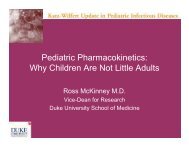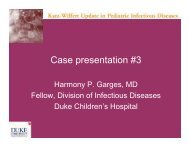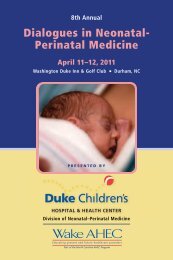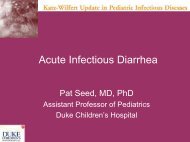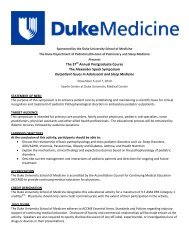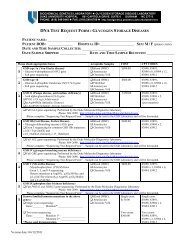2009 Pediatric Hematology/Oncology Fellowship Brochure
2009 Pediatric Hematology/Oncology Fellowship Brochure
2009 Pediatric Hematology/Oncology Fellowship Brochure
Create successful ePaper yourself
Turn your PDF publications into a flip-book with our unique Google optimized e-Paper software.
<strong>Pediatric</strong> <strong>Hematology</strong>-<strong>Oncology</strong> <strong>Fellowship</strong> ProgramThe <strong>Pediatric</strong> <strong>Hematology</strong>-<strong>Oncology</strong> <strong>Fellowship</strong> Training Program at Duke UniversityMedical Center is designed to provide a diversified, organized educational environmentthat will allow the fellow to develop both the clinical and research skills necessary tobecome an academic pediatric hematologist/oncologist. The program is dedicated todeveloping individual careers by providing a strong basic foundation in clinical andlaboratory research that allows each trainee freedom to choose their career goals.To prevent distractions and allow fellows to concentrate on acquiring their clinical andresearch skills, the fellowship is divided into one clinical year and two years dedicated toresearch. The first year of fellowship is an intensive clinical experience designed toallow the fellow to develop skills in diagnosis and current therapy for pediatrichematologic and oncologic problems. By providing a broad exposure to both commonand unusual problems in pediatric hematology, oncology, neuro-oncology, and bloodand marrow transplant the fellow will become competent in treating oncologic andhematologic disorders in children. The first year will also expose the fellow to manyareas of potential research.During the second and third year of training, the fellow’s time is committed to learningthe principles of laboratory research or, if specifically requested, pursuing formal trainingin clinical research design and implementation.Throughout all three years of training, the fellow maintains a weekly continuity clinic thatprovides the opportunity to care for patients longitudinally and to continually improveclinical skills. Fellows establish an ongoing relationship with patients and their familiesand, under the guidance of a faculty member in pediatric hematology-oncology, takeprimary responsibility for establishing chemotherapy treatment plans, participating insurgical and radiotherapy treatment decisions, and treating complications of a diseaseor its therapy.At the completion of the three year program, the fellow will have acquired the skills andexpertise necessary to meet or exceed the educational requirements for the Sub-Boardof <strong>Pediatric</strong> <strong>Hematology</strong>/<strong>Oncology</strong> of the American Board of <strong>Pediatric</strong>s.Division of <strong>Pediatric</strong> <strong>Hematology</strong>-<strong>Oncology</strong> at Duke University Medical CenterMembers of the Division provide a comprehensive range of medical services for infants,children, adolescents and young adults with malignant diseases and non-malignantblood disorders. Care is provided by a coordinated team consisting of physicians,nurses, nurse practitioners, physician’s assistants, social workers, psychologists,activities therapists, pharmacists and nutritionists.Members of the Division are actively engaged in cutting-edge laboratory and clinicalresearch in hematology and oncology. As a full institutional member of the Children's<strong>Oncology</strong> Group (COG), all members of the Division are actively involved in national1





